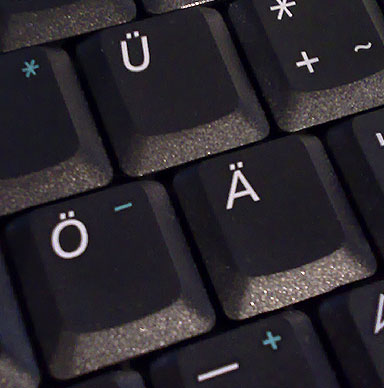 I AM READING, or rather ploughing painstakingly slowly, through a mercifully short German novel I got from the public library called Evas ungewaschene Kinder by Sonja Ruf. In English the title means Eva's Unwashed Children but there isn't an English translation and I'm wading through it ever so slowly with a notebook and a dictionary, looking up an average of one word in ten (on a bad page) to one in twenty (on a good page). Everything I look up I carefully note down, complete with page number. And of course the translation. Here's my amateur translation of the blurb:
I AM READING, or rather ploughing painstakingly slowly, through a mercifully short German novel I got from the public library called Evas ungewaschene Kinder by Sonja Ruf. In English the title means Eva's Unwashed Children but there isn't an English translation and I'm wading through it ever so slowly with a notebook and a dictionary, looking up an average of one word in ten (on a bad page) to one in twenty (on a good page). Everything I look up I carefully note down, complete with page number. And of course the translation. Here's my amateur translation of the blurb:ONE DAY God came to visit and when Eva showed him her children, he felt full of hope. But some of the children she kept hidden because they hadn't yet washed and she was ashamed of showing God her unwashed children. God knew this and said, "What is hidden from me shall be hidden from humankind also." So ever since, these children have been invisible and live in cliffs and rocks, in hills and stones. Only when they wish it, can they be seen.
Here's what Google translate makes of it:
God once came to visit, and Eva showed him their children, he was quite hopeful. But some of the children kept them hidden because they were not washed, and she was ashamed to God their unwashed children to show. What did God, and he said, "What I should remain bent, will also remain hidden from the people." Since these children for their siblings, the people, invisible and live in cliffs and rocks in the hills and rocks. Only if they wish, they can be seen.
 And the original text:
And the original text:Einmal kam Gott zu Besuch, und Eva zeigte ihm ihre Kinder, die er recht hoffnungsvoll fand. Aber einige der Kinder hielt sie versteckt, denn sie waren noch nicht gewaschen, und sie schämte sich, Gott ihre ungewaschene Kinder zu zeigen. Das wußte Gott, und er sagte, "Was mir verbogen bleiben soll, soll auch vor den Menschen verborgen bleiben." Seither sind diese Kinder für ihre Geschwister, die Menschen, unsichtbar und wohnen in Klippen und Felsen, in Hügeln und Steinen. Nur wenn sie selbst es wünschen, können sie gesehen werden.
I don't get the phrase, "ihre Kinder, die er recht hoffnungsvoll fand" and had to follow Google's idea because translated literally that would say, "her children, who he found full of hope" which doesn't really make sense. Can of you Deutsch-ssprechender readers enlighten me here please?
The German language is closely related to English. In fact, 2000 years ago, so I read, there was only one Teutonic language named proto-Germanic. But this doesn't make German anywhere nearly as easy to learn as you might expect. The grammar is very complicated (far more so than English's. E.g. adjectives don't take inflexional endings in English...). It has fewer idiomatic expressions than English and far far fewer than French, which is strewn with them. Perhaps its biggest Verwirrungspunk or confusion point, as you might say, is its vast number of words that are so very similar to one another and yet widely divergent in meaning. E.g. Käfer means "beetle" but a Käfig is a cage.
 Fahren means "to drive", vor means before: but a Vorfahr is an ancestor! But vorfahren means to drive ahead and a Vorfahrt is a right of way! There are gerzillions of seperable verbs, even more than our "phrasal verbs" in English (e.g. to pick up: aufheben) and those can portray confusing shades of meaning. Plus you have to remember to look for the separated bit (e.g. the auf)before you search for it in a dictionary, else you'll get totally lost.
Fahren means "to drive", vor means before: but a Vorfahr is an ancestor! But vorfahren means to drive ahead and a Vorfahrt is a right of way! There are gerzillions of seperable verbs, even more than our "phrasal verbs" in English (e.g. to pick up: aufheben) and those can portray confusing shades of meaning. Plus you have to remember to look for the separated bit (e.g. the auf)before you search for it in a dictionary, else you'll get totally lost.On the plus side, many German words echo English ones and have a lovely onomatopoeic quality, e.g. schmutzig = "dirty", die Verschmutzung is pollution. Others, like Geduld/geduldig (patience/patient) just sound to me like they mean what they do even though they're nothing like any word in English ~ and that I can't explain.
 When I was little I thought German was incredibly funky for its pageoverspilling portmanteau nouns e.g. Unterbewusstseinstrauma = subconscious trauma, mysteriously dotted vowels and that weird blobberous ß-thing you find splurged in the middle of the linguistic entertainment.
When I was little I thought German was incredibly funky for its pageoverspilling portmanteau nouns e.g. Unterbewusstseinstrauma = subconscious trauma, mysteriously dotted vowels and that weird blobberous ß-thing you find splurged in the middle of the linguistic entertainment. Though most English people call it an "umlaut" the two-dotted vowelly thing, as it appears in English is usually actually a diaeresis ~ a vowel-separator in words like "naïve". The German umlaut marks a change of vowel that hit the langauge in a famous late-medieaval sound shift. It only ever appears over the letters A, O and U. Ä is pronounced exactly the same as E; Ö and Ü are oo-ey sounds English-speakers must work at to get right.
Though most English people call it an "umlaut" the two-dotted vowelly thing, as it appears in English is usually actually a diaeresis ~ a vowel-separator in words like "naïve". The German umlaut marks a change of vowel that hit the langauge in a famous late-medieaval sound shift. It only ever appears over the letters A, O and U. Ä is pronounced exactly the same as E; Ö and Ü are oo-ey sounds English-speakers must work at to get right.English, incidentally, underwent a comparable vowel-shift a couple of hundred years later; it was then that the so-called "magic E" appeared in English spelling, so "bake", which had been pronounced something like "bakkeh" became pronounced as it is today.
 The blobberous ß-thing is called "ess-tset" ("SZ") after the appearance of a ligatured long S and Z in blackletter type, though it actually represents a double S. It used to appear in many words, but a still-unpopular 1996 Official Spelling Treaty signed by the German, Austrian and Swiss governments abolished this, the German language's funkiest feature from more than half of them, rendering the language vandalized and forever dullened. My very favourite word, "bloß" which means "naked" or "nearly" (such a German combination!) is now boringly rendered "bloss". The only gains in funkiness were the addition of treble consonants in compound nouns such as Balletttanzer, but that hardly makes up for the lost blobberiness. The disblobberation was challenged in a German court of law, which ruled that no government could tell anybody how to spell, except in school ~ though government departments were allowed to specify their own styles of spelling for official documents.
The blobberous ß-thing is called "ess-tset" ("SZ") after the appearance of a ligatured long S and Z in blackletter type, though it actually represents a double S. It used to appear in many words, but a still-unpopular 1996 Official Spelling Treaty signed by the German, Austrian and Swiss governments abolished this, the German language's funkiest feature from more than half of them, rendering the language vandalized and forever dullened. My very favourite word, "bloß" which means "naked" or "nearly" (such a German combination!) is now boringly rendered "bloss". The only gains in funkiness were the addition of treble consonants in compound nouns such as Balletttanzer, but that hardly makes up for the lost blobberiness. The disblobberation was challenged in a German court of law, which ruled that no government could tell anybody how to spell, except in school ~ though government departments were allowed to specify their own styles of spelling for official documents.Anyway my German is still so retarted it's taken me ten hours over three days to muddle through eighteen pages of Eva's Unwashed Children. I shall let you know when I finish!












.jpg)























5 comments:
she was ashamed to show God their unwashed children--that's how it seems to me.
Thanks for the German lesson Gleds. :)
Quite informative. I've never much liked the sound of German - so guttural - and we have many in our area. I have a number of conversations about various words with my daughter's boyfriend Sven about the language because of it's connectedness with English, I still find it fascinating.
Syd: aye ~ I'm totally stumped by it otherwise...
Akelamalu: you're welcome/herzlich Willkommen!
Jeannie: Guttural, unpleasant German??!? It sounds excellent for Grimms' Fairy Tales... Anyway it's not as guttural as Arabic that's for sure!!
Hehe, Gled ... just read through it. Gave you an answer regarding the translation on my blog. Anymore questions, just email me on karina.stoitzner@btinternet.com. Maybe I should apply to translate the book :)
Take care xx
Post a Comment